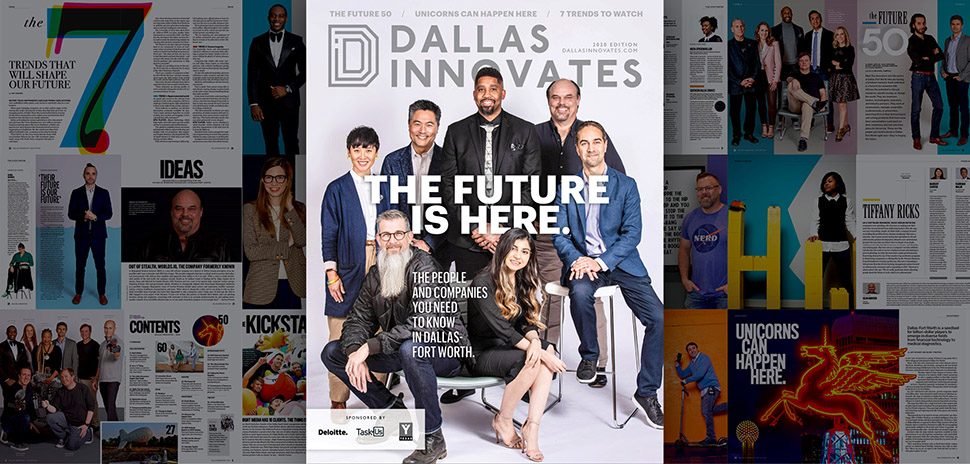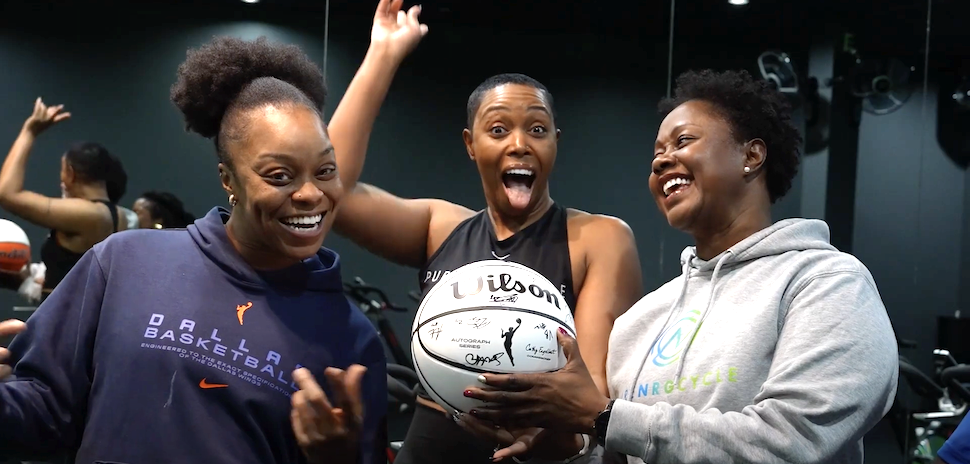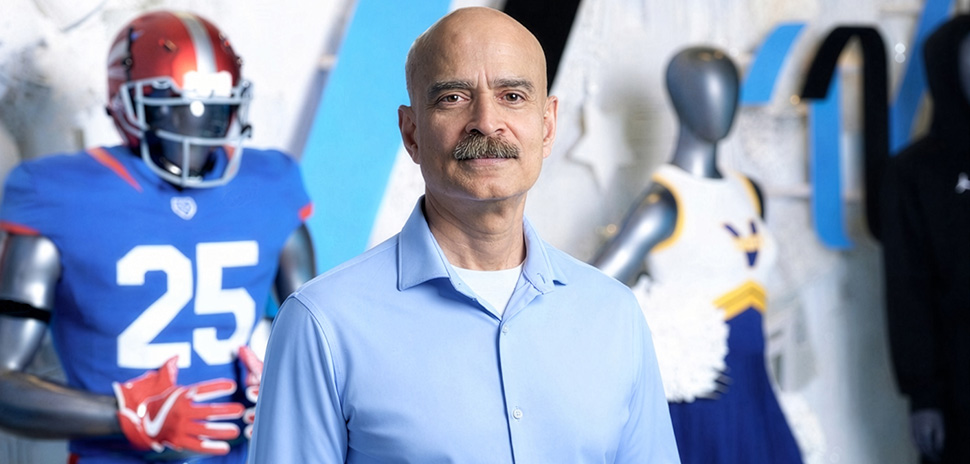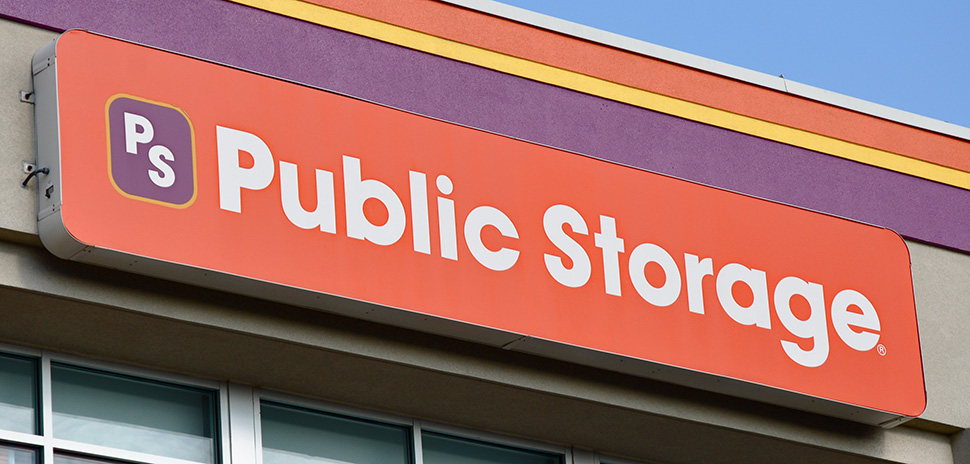In a city known for big ideas, two successful Dallas tech entrepreneurs are thinking life-size.
Daniel Black, founder of retail technology powerhouse Glass-Media, and Steve Deitz, founder of experience design agency 900lbs, have combined their expertise to launch PeerVsn (pronounced Peer Vision), a new venture that makes life-size, real-time streaming communication accessible across industries.
The platform, which emerged from stealth in June at this year’s InfoComm in Las Vegas, introduces a portable, battery-powered streaming system that its creators believe will transform how people connect in corporate settings, education, entertainment, sports, healthcare, and retail.
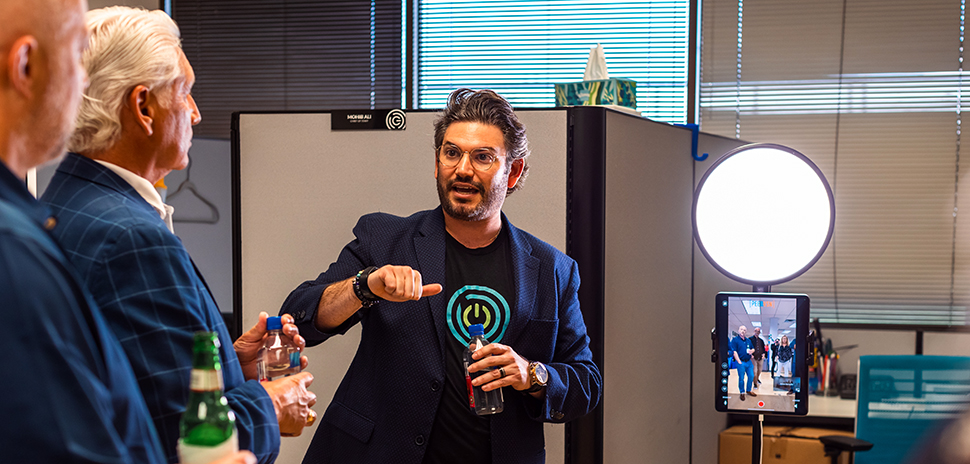
Glass-Media’s Daniel Black demonstrating PeerVsn technology. [Photo: PeerVsn]
“With the click of a button, PeerVsn brings executives and board meetings together in a unique way that saves time and travel expenses,” Deitz said. “Life-size scale provides more impact and focus than a half-filled browser window.”
The duo’s new partnership comes after years of knowing—and admiring—each other professionally.
“We’ve eagerly sought opportunities to collaborate,” Black told Dallas Innovates. While other opportunities “arose and passed,” this one resonated with a shared belief in the product and a passion to innovate within the industry space, Black says.
“Our teams are very complementary,” Deitz added. Black brings to the table Glass-Media’s prowess in product innovation, design, and engineering in digital signage, while Deitz contributes 900lbs’ expertise in technical software development, interactive UI/UX design, and unique visual storytelling.
Now, with their combined expertise, Black and Deitz are poised to make a significant impact in a market ripe with opportunity.
Earlier this month, Fortune Business Insights put the video conferencing market at a whopping $28.61 billion in 2023, projecting growth to $60.17 billion by 2032. And industry giants Gartner, Deloitte, and EY have recently noted growth trends in video conferencing and telepresence market, as companies continue to invest in remote collaboration tools and virtual meeting solutions.

[Photo: PeerVsn]
Emerging from stealth and named Best of Show 2024
PeerVsn has already garnered industry attention.
After its Las Vegas debut in the Trailblazers’ Zone at North America’s largest audiovisual trade show, the company was named Best of Show in Rave Pub’s “Best of InfoComm” Best New Technology 2024 awards. The company’s tech was noted for hardware and software that offer an “easy way to ‘beam in’ a life-size presenter.”
Black and Deitz envision a wide range of applications for their technology. “We’re bringing a broader reach to education and business than ever imagined,” they told Dallas Innovates.
The founders outlined scenarios including guest lecturers beaming into classrooms, executives holding virtual board meetings, star athletes chatting with high school recruits in locker rooms, and even fashion influencers popping up in stores.

[Photo: PeerVsn]
Leveraging the “second-mover” advantage
Being first to market isn’t always best. Despite entering a market with established players, Black and Deitz see advantages in their position as “second movers.” The founders explained that being a second-mover allows them to learn from others’ product strategies, feature sets, and marketing techniques, and differentiate where it matters most.
“We have taken advantage of learning from our competitors,” the founders explained.
The approach has allowed PeerVsn to identify and address specific market gaps. While early entrants like Proto, ARHT Box, and HoloConnect have created buzz with so-called “holographic” displays, PeerVsn has focused on practicality and accessibility, the founders told us.
“The biggest market gaps we have identified, aside from price, were form factor and portability,” Deitz said. The company has also prioritized ease of use, designing the system to be user-friendly, addressing a major industry pain point—the complexity of traditional broadcasting equipment. Users can reportedly set up and start broadcasting from virtually anywhere—indoors or out—in minutes.

[Photo: PeerVsn]
“We’re pushing the boundaries of what modern internet networks can do to get the best resolution and latency in whatever network conditions are available where the customers are at,” Black said.
What’s more, Deitz and Black say, the screens are compact enough to squeeze into tight spaces and navigate narrow corridors, making them work for everything from boardroom pow-wows to hospital corridors.
But the founders know “one size does not fit all” in this market. A real game-changer, they say, is the custom-built software platform. It gives users unprecedented flexibility to customize their broadcasts, allowing them to tweak settings to their heart’s content.
Overall, Deitz and Black see the opportunity to deliver their product at scale at the right price point. Their product, they emphasize, is a practical tool, not an “not an overhyped, overpriced, hologram gimmick.”
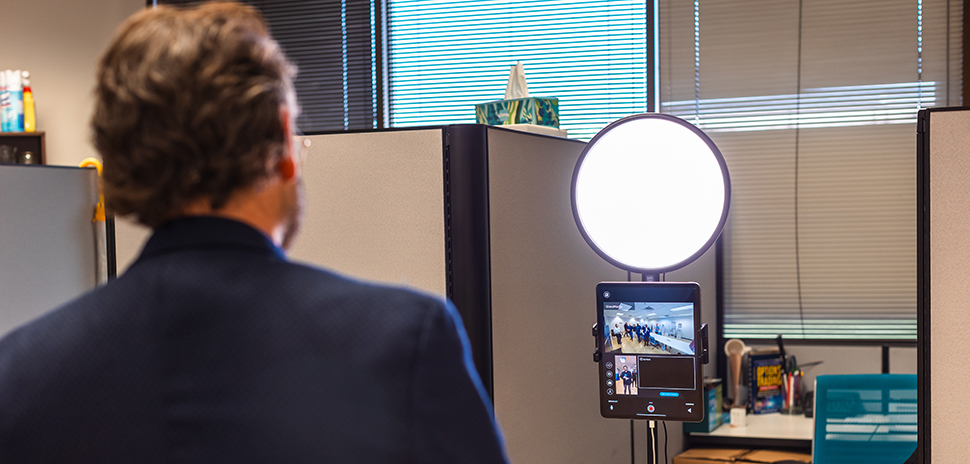
[Photo: PeerVsn]
PeerVsn bets on Made-in-Dallas strategy
The founders acknowledge that PeerVsn is operating in a competitive market with a need to prove its claims of superiority in price, flexibility, and modularity against established players.
One key? PeerVsn is betting on a local manufacturing strategy. The company produces its entire product line in Dallas, a decision the founders say is crucial to their approach to speed, quality, and rapid innovation.
“Speed to market is crucial, and onshore production immediately reduces lead times by an average of 5 to 6 weeks compared to ocean shipping,” the founders explained. This reduction in lead times allows PeerVsn to respond more quickly to market demands and introduce innovations faster.
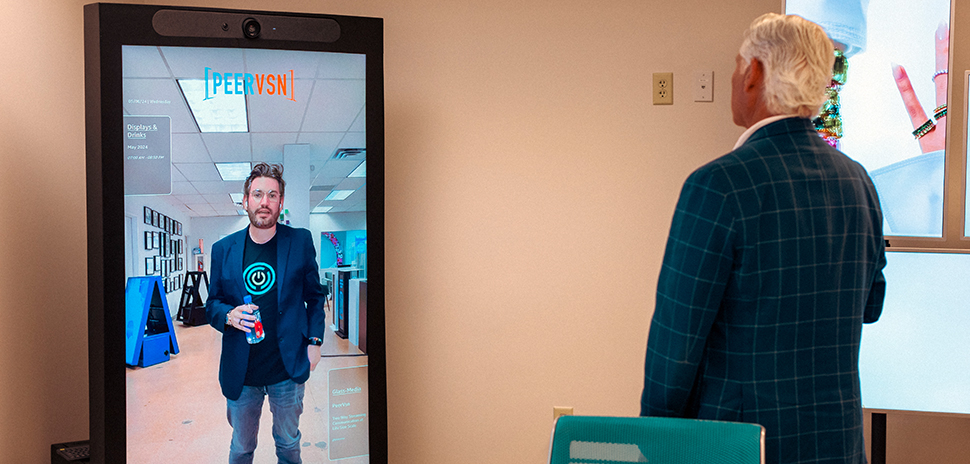
Peer-to-peer connection with PeerVsn. [Photo: PeerVsn]
The decision to manufacture locally was bolstered by Black’s existing connections in the area. His company Glass-Media partnered with Diesel Displays to open a new 150,000-square-foot manufacturing facility in Farmers Branch in 2022.
“We already have a strong presence throughout Dallas-Fort Worth, forming strategic partnerships with numerous suppliers, vendors, and fellow fabricators and manufacturers,” Black said.
The proximity to production is a boon for product development. As the founders noted, “Being deeply involved in product development enables us to quickly produce physical prototypes for evaluation, applying insights to new iterations and design modifications.”
The company is also tapping into local talent. “900lbs has helped the growth of immense talent from local universities like UTD, SMU Art Guild, and UNT,” Deitz noted, highlighting how local skills contribute to their innovation efforts.
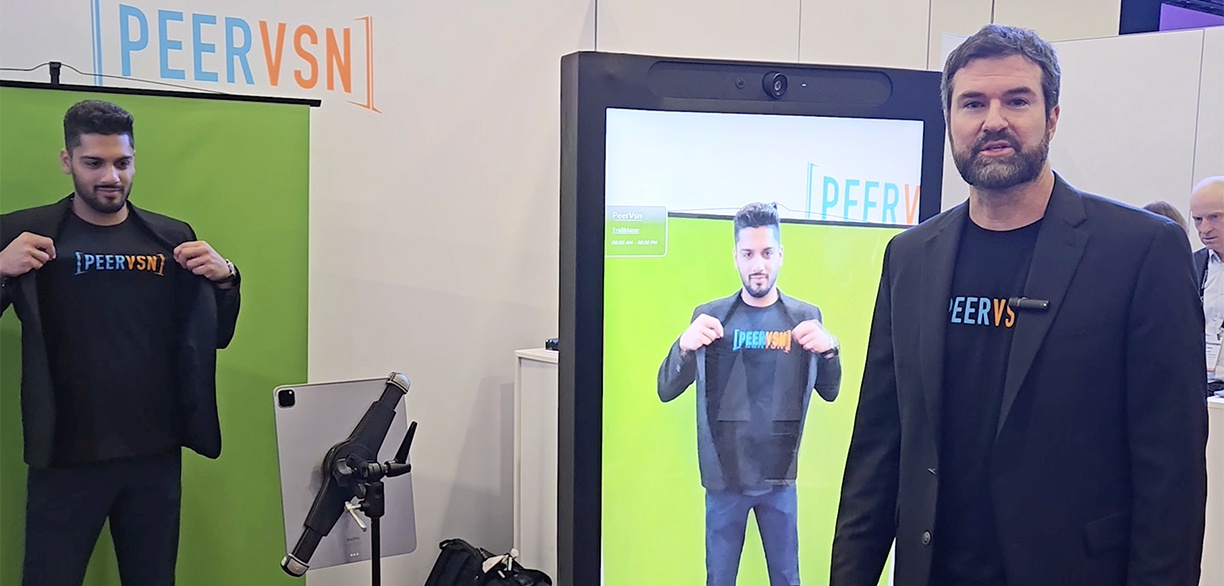
Steve Deitz at InfoComm 2024 in June.
Funding and founding PeerVsn
When asked about PeerVsn’s development funding, Deitz revealed a bootstrapped approach.
“Daniel and I have funded our early-stage software development, design and prototypes with internal investments,” he said. By leveraging the combined expertise and capabilities of both their companies, they achieved a minimum viable product (MVP) without external investment, he says.
The journey from concept to launch has been swift. “Steve and I started discussing the technical and product concept in February 2023,” Black added. “On July 18, 2023, we purchased the domain www.peervsn.com.” The the team accelerated product development by deploying an activation in September 2023, which used a significant portion of their existing work.
The decision to emerge from stealth mode at Infocomm 2024 was strategic. “With the increase in indirect competitors in the market, we believe now is the ideal time to emerge and capitalize on our differentiated product and platform,” Black explained.
PeerVsn’s early positive industry response is thanks in part to early supporters during product testing and marketing cycles, according to the founders.
“Over the past year, several Dallas-based businesses, executives and talent helped support our quality assurance testing and marketing focuses,” Deitz says, with a shoutout to Jim Keyes, former CEO of Blockbuster and 7-Eleven, along with Tangram Interiors, The KOCH House, Forty Five Ten, RevTech, Robert Hastings & Associates, Priya Rathod, Kris Howe and Global Paleo Services, Diesel Displays, and UT Dallas.
Now, as it officially goes to market, PeerVsn is launching its invite-only reseller model—and the company is betting on aggressive profit sharing and exclusivity to drive growth.
“This approach will open the doors to volume and reach, especially in the traditional verticals that are largely serviced by large AV integrators with long-standing relationships,” Deitz explains.
He hints that PeerVsn is also introducing more AI and “delightful features and new form factors.”
Expanding human connection
But at the heart of PeerVsn’s ethos is the expansion of human connection, the founders said.
Their vision is about more than technology; it’s about fostering real connections and making an impact on how humans communicate and engage with each other.
“Our mission is to unlock the potential of real-time, life-size streaming, bringing people and communities together in ways once only depicted in futuristic movies,” Black said.
![]()
Get on the list.
Dallas Innovates, every day.
Sign up to keep your eye on what’s new and next in Dallas-Fort Worth, every day.




